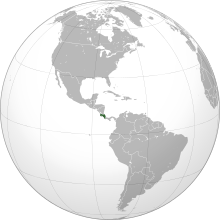LGBTQ rights in Costa Rica | |
|---|---|
 | |
| Status | Legal since 1971[1] |
| Gender identity | Transgender people allowed to change legal gender |
| Military | No armed forces |
| Discrimination protections | Sexual orientation protections since 1998 |
| Family rights | |
| Recognition of relationships | Same-sex marriage since 2020 |
| Adoption | Full adoption rights since 2020 |
Lesbian, gay, bisexual, transgender, and queer (LGBTQ) rights in Costa Rica have evolved significantly in the past decades. Same-sex sexual relations have been legal since 1971.[1] In January 2018, the Inter-American Court of Human Rights made mandatory the approbation of same-sex marriage, adoption for same-sex couples and the removal of people's sex from all Costa Rican ID cards issued since October 2018.[2] The Costa Rican Government announced that it would apply the rulings in the following months.[3][4] In August 2018, the Costa Rican Supreme Court ruled against the country's same-sex marriage ban, and gave the Legislative Assembly 18 months to reform the law accordingly, otherwise the ban would be abolished automatically. Same-sex marriage became legal on 26 May 2020.
Human Rights Watch has described Costa Rica as "committ[ed] to [equal] rights" and an "inspiration for other countries [in Central America]".[5] Discrimination on the basis of sexual orientation is prohibited in employment and other areas, and transgender people are permitted to change their legal gender on official identity documents to reflect their gender identity, including driver's licenses, passports, and ID cards.
- ^ a b State-sponsored Homophobia A world survey of laws prohibiting same sex activity between consenting adults Archived 17 October 2012 at the Wayback Machine
- ^ "Cédulas sin sexo: TSE apuesta a la identidad de género | Crhoy.com". CRHoy.com | Periodico Digital | Costa Rica Noticias 24/7 (in Spanish). Retrieved 5 May 2021.
- ^ "Corte Interamericana de DD. HH: Costa Rica debe garantizar plenos derechos a población LGBTI". Teletica. 9 January 2018. Retrieved 9 January 2018.
- ^ Ramírez, Luis (9 January 2018). "Implementar matrimonio gay como pide Corte IDH no requiere del Congreso, según gobierno". Amelia Rueda. Retrieved 9 January 2018.
- ^ González Cabrera, Cristian (3 June 2020). "Costa Rica's Progress on Marriage Equality Should Inspire the Region". Human Rights Watch.